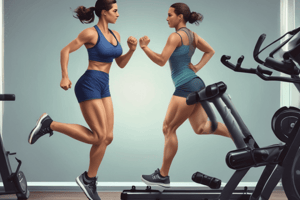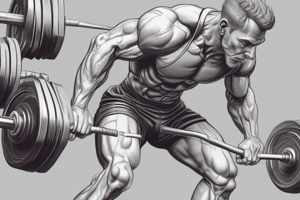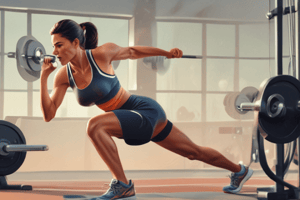Podcast
Questions and Answers
What is the primary goal of the overload principle in fitness training?
What is the primary goal of the overload principle in fitness training?
- To progressively stress the muscles to adapt to greater demands (correct)
- To enhance flexibility
- To increase muscle strength
- To improve cardiovascular endurance
Which energy system is primarily responsible for short-duration, high-intensity exercises?
Which energy system is primarily responsible for short-duration, high-intensity exercises?
- ATP-PC (correct)
- Oxidative phosphorylation
- Aerobic respiration
- Anaerobic glycolysis
What is the primary cause of overuse injuries in athletes?
What is the primary cause of overuse injuries in athletes?
- Poor biomechanics
- Trauma
- Overtraining (correct)
- Inadequate warm-up and cool-down
What is the primary focus of intrinsic motivation in sport psychology?
What is the primary focus of intrinsic motivation in sport psychology?
What is the primary goal of the RICE principle in injury management?
What is the primary goal of the RICE principle in injury management?
What is the primary goal of mental skills training in sport psychology?
What is the primary goal of mental skills training in sport psychology?
Flashcards are hidden until you start studying
Study Notes
Fitness Training
- Components of fitness: cardiovascular endurance, muscular strength, muscular endurance, flexibility, body composition
- Types of fitness training: aerobic, anaerobic, resistance, flexibility, plyometric
- Principles of training: overload, specificity, progressive overload, reversibility
- Methods of fitness training: weightlifting, cardio machines, bodyweight exercises, high-intensity interval training (HIIT)
Exercise Physiology
- Energy systems: ATP-PC, anaerobic glycolysis, aerobic respiration
- Physiological responses to exercise: increases in heart rate, blood pressure, ventilation, and body temperature
- Exercise intensity: measured by percentage of maximal oxygen uptake (VO2max), heart rate reserve, and rating of perceived exertion (RPE)
- Physiological adaptations to exercise: increased muscle strength and endurance, improved cardiovascular function, enhanced thermoregulation
Athletic Injuries
- Types of injuries: acute (e.g., sprains, strains), overuse (e.g., tendinitis, stress fractures), chronic (e.g., osteoarthritis)
- Causes of injuries: trauma, overtraining, poor biomechanics, inadequate warm-up and cool-down
- Injury prevention strategies: proper warm-up and cool-down, strengthening exercises, proprioception and balance training, equipment and safety measures
- Injury management: RICE (rest, ice, compression, elevation) principle, rehabilitation, and return-to-play protocols
Sport Psychology
- Performance anxiety: fear of failure, pressure to perform, self-doubt
- Motivation: intrinsic (e.g., enjoyment, personal growth), extrinsic (e.g., rewards, recognition)
- Goal setting: specific, measurable, achievable, relevant, and time-bound (SMART) goals
- Mental skills training: visualization, positive self-talk, relaxation techniques, and concentration exercises
- Team dynamics: communication, cohesion, leadership, and conflict resolution
Studying That Suits You
Use AI to generate personalized quizzes and flashcards to suit your learning preferences.




